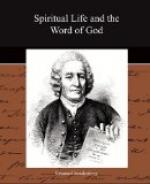The eighth commandment of the Decalogue, “Thou shalt not bear false witness,” shall now be explained. “To bear false witness” signifies in the sense nearest to the letter to lie about the neighbor by accusing him falsely. But in the internal sense it signifies to call what is just unjust, and what is unjust just, and to confirm this by means of falsities; while in the inmost sense it signifies to falsity the truth and good of the Word, and on the other hand to prove a falsity of doctrine to be true by confirming it by means of fallacies, appearances, fabrications, knowledges falsely applied, sophistries, and the like. The confirmations themselves and the consequent persuasions are false witnesses, for they are false attestations.
From this it can be seen that what is here meant is not only false witness before a judge, but even a judge himself who in perverting right makes what is just unjust, and what is unjust just, for he as well as the witness himself acts the part of a false witness. The same is true of every man who makes what is straight to appear crooked, and what is crooked to appear straight; likewise any ecclesiastical leader who falsifies the truth of the Word and perverts its good. In a word, every falsification of truth, spiritual, moral, and civil, which is done from an evil heart, is false witness. (A.E., n. 1019.)
When a man abstains from false testimonies understood in a moral and spiritual sense, and shuns and turns away from them as sins, a love of truth and a love of justice flow in from the Lord through heaven. And when, in consequence, the man loves truth and loves justice he loves the Lord, for the Lord is truth itself and justice itself. And when a man loves truth and justice it may be said that truth and justice love him, because the Lord loves him; and as a consequence his utterances become utterances of truth, and his works become works of justice. (A.E., n. 1020.)
IX: The Ninth and Tenth Commandments
The ninth commandment, “Thou shalt not covet thy neighbor’s house,” is now to be treated of. There are two loves from which all lusts spring and flow forth perpetually like streams from their fountains. These loves are called love of the world and love of self. Lust is a love continually desiring, for what a man loves, that he continually longs for. But lusts belong to the love of evil, while desires and affections belong to the love of good. Now because love of the world and love of self are the fountains of all lusts, and all evil lusts are forbidden in these last two commandments, it follows that the ninth commandment forbids the lusts that flow from love of the world, and the tenth commandment the lusts that flow from love of self. “Not to covet a neighbor’s house” means not to covet his goods, which in general are possessions of wealth, and not to appropriate them to oneself by evil arts. This lust belongs to love of the world. (A.E., n. 1021.)




